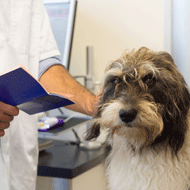Pet owners urged to seek advice on travel after Brexit

Those preparing to travel from November onwards must contact their veterinary surgeon at least four months ahead of their scheduled travel date.
The Government is encouraging pet owners to revisit official advice about travelling with their animal to the EU after Brexit.
Defra states that if the UK leaves the EU without a deal on October 31, pet owners will need to take additional steps to ensure they can still travel with their animals. This includes a three-calendar month wait before travel and a blood test a minimum of 30 days after the pet’s last rabies vaccination.
Those preparing to travel from November onwards must contact their veterinary surgeon at least four months ahead of their scheduled travel date. For example, if somebody wishes to travel on November 1, they need to discuss their needs with their vet by 1 July at the latest.
“This is a reminder for pet owners of our practical and straightforward advice for pet travel if the UK were to leave the EU in a no-deal situation, said UK chief veterinary officer Christine Middlemiss. “Those pet owners who wish to travel with their pets immediately after 31 October 2019 should consult with their vet as soon as they can.”
She added: “This is about planning ahead to ensure their pet has the correct health protection documented and in place for all possible Exit scenarios. We continue to be in contact with vets to highlight this issue and they are expecting pet owners to consult with them and plan ahead.”
Up-to-date advice on pet travel advice can be found on GOV.UK or by searching ‘pet travel’.



 The WSAVA has invited veterinary professionals to a webinar on responsible antibiotic usage in dentistry.
The WSAVA has invited veterinary professionals to a webinar on responsible antibiotic usage in dentistry.